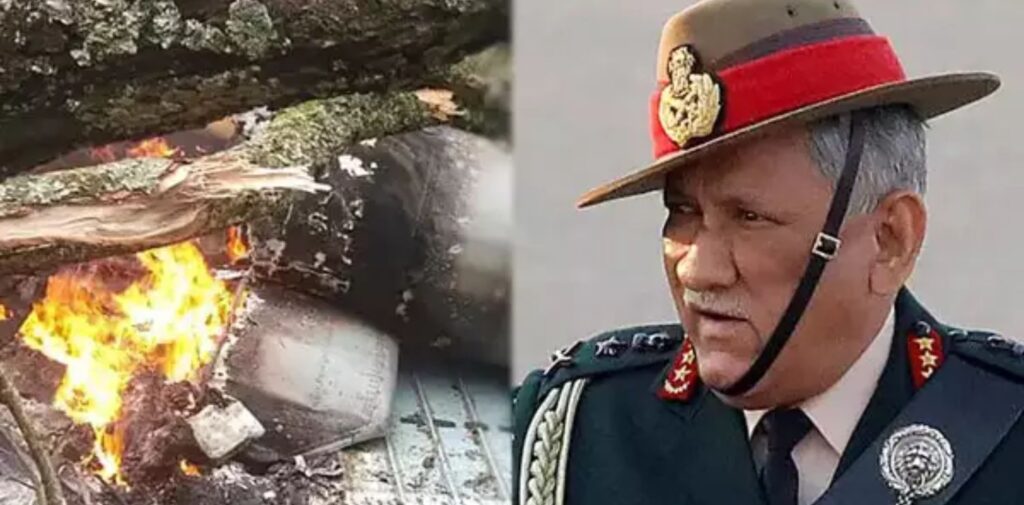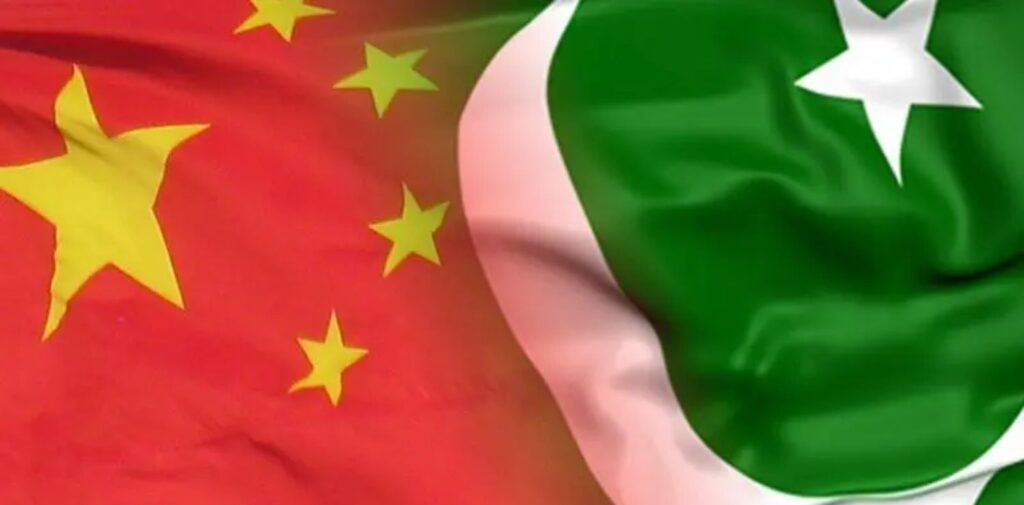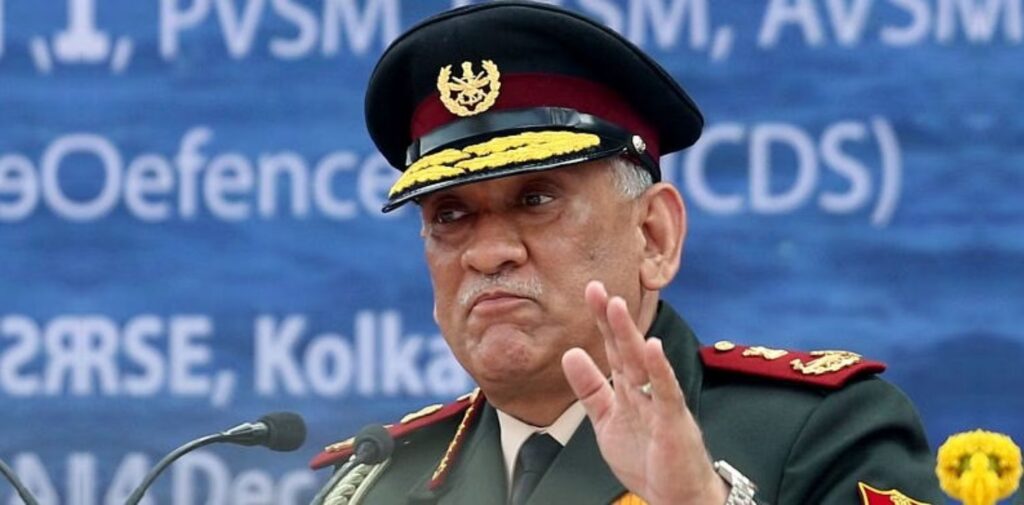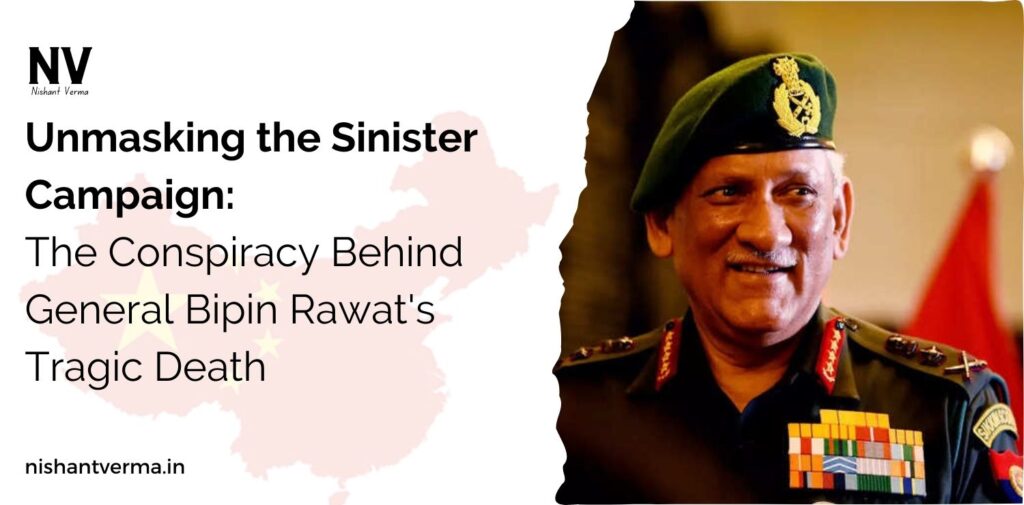General Bipin Rawat’s untimely demise in a helicopter crash on December 8, 2021, sent shockwaves throughout India. As the nation’s first Chief of Defence Staff (CDS), his death not only left a significant void in India’s military leadership but also triggered a wave of conspiracy theories, many propagated by Pakistan and China based social media entities. While official investigations attributed the crash to bad weather conditions, these theories seek to cloud the reality and fuel tensions, particularly focusing on a potential “enemy hand” behind the incident.
The Crash of General Bipin Rawat Death: What Happened?
On that fateful day, General Rawat, his wife, and 12 other military personnel boarded an Indian Air Force Mi-17V5 helicopter from the Sulur Air Force base in Tamil Nadu, headed for Wellington. Shortly after takeoff, the helicopter crashed into the Nilgiri Hills, resulting in the deaths of all but one on board. While the investigation concluded that bad weather likely caused the crash, with poor visibility contributing to disorientation in the helicopter’s navigation, the surrounding discourse soon turned darker.
Reports from credible sources, including The Times of India and The Print, highlighted how within hours of the crash, social media accounts linked to Pakistan began spreading conspiracy theories. These accounts pushed narratives suggesting sabotage, with many speculating that General Rawat was deliberately targeted. These theories were not only limited to rogue social media users but were amplified by coordinated campaigns.

The Role of Pakistan and China: A Coordinated Propaganda Effort
Several articles pointed to how these conspiracy theories were part of a broader information warfare tactic, where Pakistan-based elements sought to exploit the tragic event. According to sources, the primary goal of this disinformation campaign was to destabilize India’s perception of its internal security and to sow doubts about the credibility of its military leadership. Bots and troll accounts originating from Pakistan flooded social media platforms with baseless claims, suggesting that the crash was a result of either internal sabotage or covert operations by foreign powers.
China’s involvement in these theories cannot be ignored either. General Rawat was known for his strong stance on China, especially during the Doklam standoff of 2017, where he played a pivotal role in maintaining India’s firm position against Chinese encroachment. This naturally made him a target for propaganda campaigns. Platforms like Quora saw questions asking whether China had a hand in the incident, despite no concrete evidence linking Beijing to the crash. These questions aimed to amplify the theory of external involvement, further inflaming tensions.
The disinformation campaign spread across multiple channels, with a sharp focus on leveraging anti-India sentiments to create an atmosphere of suspicion and doubt. The sinister role of China and Pakistan in fueling such narratives is reminiscent of earlier efforts where both countries have tried to destabilize India’s national discourse, particularly on sensitive matters of defence.

General Bipin Rawat: A Threat to China and Pakistan
To understand why General Bipin Rawat’s death attracted such speculation, one must look at his legacy. As India’s first CDS, Rawat was instrumental in shaping the modernization of India’s armed forces, pushing for integrated theatre commands and advocating for better coordination between the Army, Navy, and Air Force. His tenure as the Army Chief saw him lead India through crucial moments, including the Doklam standoff with China and handling counter-terrorism operations along the Line of Control (LoC) with Pakistan.
His military strategies, especially concerning China’s aggressive posturing in the Indo-Pacific region, made him a thorn in the side of both Beijing and Islamabad. General Rawat’s emphasis on maintaining a strong defence against China’s territorial ambitions was widely recognized as a cornerstone of India’s military policy. This made him a figure of immense national importance, and naturally, his sudden death raised concerns about the possibility of foul play.

The Dangerous Spread of Misinformation
The spread of conspiracy theories following General Rawat’s death illustrates a larger issue: the use of misinformation as a tool for geopolitical warfare. Social media platforms have become battlegrounds where state and non-state actors can manipulate public perception and fuel discord. In this case, Pakistan and China have leveraged their propaganda machinery to suggest that Rawat’s death was not an accident but a well-coordinated attack.
One of the most notable aspects of this campaign was its scale. Within hours of the crash, hashtags, posts, and comments surfaced on Twitter and Facebook, questioning the official explanation of the crash. Accounts tied to Pakistani sources led the charge, with coordinated efforts to push these narratives into trending topics.
India’s Response: A Need for Vigilance
The Indian government and military maintained a cautious stance, emphasizing the findings of the official investigation and urging the public to avoid falling prey to baseless rumours. However, the incident highlights the importance of countering disinformation, especially when it comes to matters of national security. The rapid spread of conspiracy theories also underscores the need for more stringent regulations on social media platforms to prevent the amplification of such harmful content.
While there has been no concrete evidence linking Pakistan or China directly to General Rawat’s death, their role in spreading disinformation cannot be overlooked. As the world becomes increasingly interconnected, nations must remain vigilant against these subtle yet damaging forms of information warfare.
Conclusion: Beware the Enemy Within
The tragic death of General Bipin Rawat is a solemn reminder of the challenges India faces, not only from external adversaries but also from the dangerous spread of misinformation. As both Pakistan and China continue to wage psychological and information warfare, India must strengthen its internal mechanisms to combat these threats. General Rawat’s legacy as a stalwart defender of India’s sovereignty must not be tarnished by unfounded conspiracy theories.
As India mourns the loss of one of its finest military leaders, it is crucial to remain vigilant against the disinformation tactics deployed by enemies like Pakistan and China. The battle for India’s security does not only take place on the battlefield—it is also fought in the realm of information, where truth is often the first casualty.




